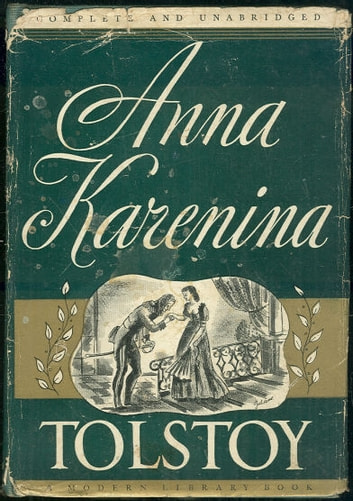Anna Karenina
Leo Tolstoy










 Feels kind of silly to try to say something about this book that hasn’t been said already, so I won’t. If you are like me and enjoy doing things that take a long time, sometimes unnecessarily, you should read this book. As is true with most classics, it is so much more readable than we tend to build ourselves up to believe, and the parts that dragged on..well, I skimmed them. I don’t feel bad about this because even Nabokov said, “They love the artist in him and are intensely bored by the preacher; but at the same time it is rather difficult to separate Tolstoy the preacher from Tolstoy the artist…What one would like to do, would be to kick the glorified soapbox from under his sandalled feet and then lock him up in a stone house on a desert island with gallons of ink and reams of paper—far away from the things, ethical and pedagogical, that diverted his attention from observing the way the dark hair curled above Anna's white neck.”
Feels kind of silly to try to say something about this book that hasn’t been said already, so I won’t. If you are like me and enjoy doing things that take a long time, sometimes unnecessarily, you should read this book. As is true with most classics, it is so much more readable than we tend to build ourselves up to believe, and the parts that dragged on..well, I skimmed them. I don’t feel bad about this because even Nabokov said, “They love the artist in him and are intensely bored by the preacher; but at the same time it is rather difficult to separate Tolstoy the preacher from Tolstoy the artist…What one would like to do, would be to kick the glorified soapbox from under his sandalled feet and then lock him up in a stone house on a desert island with gallons of ink and reams of paper—far away from the things, ethical and pedagogical, that diverted his attention from observing the way the dark hair curled above Anna's white neck.”
It’s true that the two sides of Tolstoy felt inseparable and that I actually did appreciate some (not all) of those “preaching” moments. In a way, it felt like a fourth wall breaker - I like to think of it as Tolstoy taking a break from his story to act out his thoughts on religion, class, poverty, farming, and the opera using the characters as his Barbies, which is weirdly a genre of art I am fully into. The first notes I took on this book were actually not at all about the love affair, but about how insane it felt to be reading a novel set in 1800’s Russia and to find the politics entirely relatable. The issues of racial inequalities, a government that was only interested in its nobility, the impending Russian Revolution in the air felt so (sadly)…modern? But take this with a grain of salt, as I am not educated on this beyond what was told to me in the pages of Anna Karenina through Tolstoy’s over-encumbered ethics. One thing I do know - a birth scene written by a man is enough to traumatize any young person out of the idea of having a baby.
Anna and Vronsky have a love like a speeding train (sorry), and it was agonizing (in a good way) to witness. Some people really are the agents of their own misery, and I wonder for Anna how much of it was due to the fully oppressive society she lived in and how much was her own guilt driven self-schadenfreude?
I’m excited to think about this book nonstop for the next month.
Read if you like: toxic relationships, red bags, moving slowly, holding 800 pages in your hands, having a Joe Wright/Keira Knightley film to look forward to at the end.